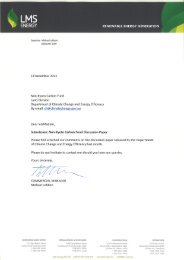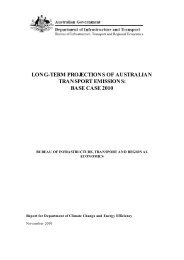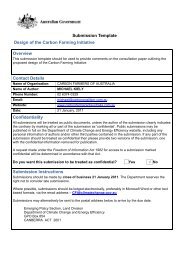Enterprise Agreement 2011-14 - Department of Climate Change
Enterprise Agreement 2011-14 - Department of Climate Change
Enterprise Agreement 2011-14 - Department of Climate Change
Create successful ePaper yourself
Turn your PDF publications into a flip-book with our unique Google optimized e-Paper software.
<strong>Department</strong> <strong>of</strong> <strong>Climate</strong> <strong>Change</strong> and Energy Efficiency – <strong>Enterprise</strong> <strong>Agreement</strong> <strong>2011</strong>-<strong>14</strong><br />
25.4. Executive Level employees (and their equivalents) are not generally entitled to overtime.<br />
However, in exceptional circumstances, the Secretary may approve overtime payments for<br />
excess hours worked where considered appropriate.<br />
25.5. A part time employee who has not elected to receive flextime for work performed in excess<br />
<strong>of</strong> the agreed hours <strong>of</strong> duty over the settlement period will be eligible for overtime.<br />
25.6. Where an employee is directed to perform overtime and is approved in advance by the<br />
Manager, overtime will be paid.<br />
25.7. Time spent travelling to or from work will not count as part <strong>of</strong> an overtime attendance.<br />
25.8. Where overtime is worked, TOIL is calculated at the following rates:<br />
Monday to Friday<br />
Saturday<br />
Period Rate<br />
Sunday Double time.<br />
Public Holidays, from 8:30 am to 5:00 pm<br />
Time and one half for the first three<br />
hours and double time thereafter.<br />
Time and one half for the first three<br />
hours and double time thereafter.<br />
Time and one half (in addition to normal<br />
salary).<br />
Public Holidays, for any other hours Double time and one half.<br />
25.9. In calculating the overtime entitlement, a divisor <strong>of</strong> 37.5 hours is to be used.<br />
25.10. Where overtime is worked on a public holiday which falls on a weekday, the overtime<br />
payment or TOIL is calculated at double time and a half for duty outside the standard day for<br />
full time employees (i.e. a standard day is from 8:30am to 5:00pm or the agreed pattern <strong>of</strong><br />
hours for part-time employees). For overtime within the standard day for full time<br />
employees or agreed pattern <strong>of</strong> hours for part-time employees, overtime payment or TOIL<br />
will be calculated at single time and a half as employees are already being paid single time<br />
for this period for the public holiday.<br />
25.11. Where a period <strong>of</strong> overtime is not continuous with ordinary duty, the minimum overtime<br />
payment is four hours at the relevant rate. Where the period <strong>of</strong> overtime is greater than four<br />
hours, payment will be made for the actual period worked at the relevant rate.<br />
25.12. Overtime is considered to be continuous with ordinary duty when an employee does not<br />
have a break, other than a meal break, between the periods <strong>of</strong> ordinary duty and overtime.<br />
25.13. Where more than one attendance is involved, the minimum overtime payment provision will<br />
not operate to increase an employee’s overtime payment beyond that which they would<br />
have received had they remained on duty from the commencing time <strong>of</strong> duty on one<br />
attendance, to the ceasing time <strong>of</strong> duty on a subsequent attendance.<br />
17






